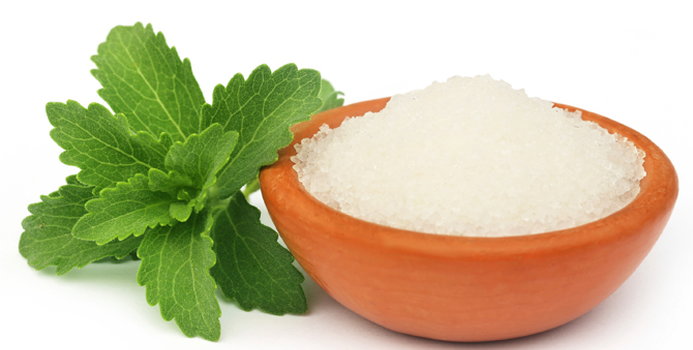Stevia is a high-intensity sweetener made from the Stevia rebaudiana plant. The Steviol Glycosides obtained from the leaves of this plant are very sweet and the plant in general is being used and purified into a variety of forms. As with many non-nutritive sweeteners, this sweetener is popular because it is calorie-free. The FDA has not approved the use of whole-leaf Stevia or crude Stevia extracts because as a food additive yet. Furthermore, the FDA does not consider it to be a GRAS food (Generally Recognized As Safe) because of reports of side effects in its whole-leaf or crude extract form. Some of the literature has reported issues with effects on reproductive, cardiovascular and renal systems. However, Rebaudioside A is a highly purified product made from Stevia and has gained GRAS notices for 5 different companies from the FDA.
Stevia/ high purity steviol glycosides are already included in many products. Some of the most common brand names include Truvia, PureVia, Enliten. The high purity products are considered ~200-400x sweeter than table sugar. Additionally, although not yet determined by the FDA, the Joint FAO/WHO Expert Committee on Food Additives (JECFA) has said that the ADI (Acceptable Daily Intake) is 4 (mg/kg bw/d), or about 29 packets.
So what are some of the side effects that you should be wary of if you like the flavor and use Stevia products regularly?
1. An Allergen
Some people have reported having an allergic reaction to Stevia, especially for those people who already react to common allergens like chrysanthemums, marigolds, ragweed or daisies. An allergic reaction may include shortness of breath, hives, difficulty swallowing, wheezing or weakness. As with all allergic reactions, see medical treatment to prevent serious complications.
2. Nausea
Stevia sweeteners contain stevioside, which has been reported to cause nausea, bloating, or upset stomach in some people. This reaction is often mild but if you are having any of these symptoms, consider decreasing your Stevia product consumption.
3. Diabetes or Low Blood Pressure
Some inconclusive research as shown evidence that consuming large quantities of stevioside can negatively affect blood sugar or blood pressure levels. Consult with your doctor if you think you are consuming more than the ADI (Acceptable Daily Intake) or are having problems with managing your blood pressure or blood glucose levels.
4. If you are pregnant, breastfeeding or a child
Keep in mind that that some associated products have not been approved for pregnant women, breastfeeding women and children. While many studies report no effects on multiple generations of hamsters or mice, further research on differing levels amounts and forms has yet to be done or show conclusive evidence of safety.
So while there are many good reasons to use forms of the Stevia plant, continue to watch as further research is done on the variety of different ways this plant is used.

Emily DeLacey MS, RD is a Registered Dietitian and currently working in Jamaica as a HIV/ AIDS Prevention Specialist. She attended Central Washington University for her Bachelor's Degree in Science and Dietetics and continued on after her internship to Kent State University for her Master's Degree in Science and Nutrition, with a focus on public health and advocacy. She served as a U.S. Peace Corps Volunteer in Malawi 2012-2014 working as a Community Health Advisor in a rural village, immersing in the joys of life without electricity or running water. She has been to 20+ countries and 47 of the 50 states in the US. Traveling, adventuring and experiencing new cultures has made her a passionate advocate for the equality of nutrition and wellness for all people.



